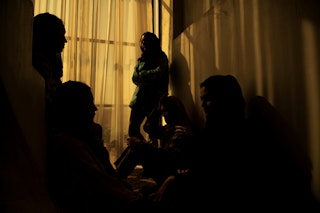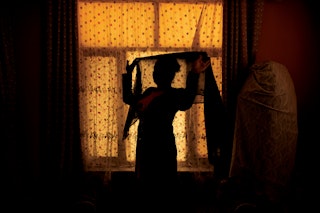I only hope for the people to remain strong, steady, and not lose hope.
Naghma
"I am Naghma, aged 27. I hold a bachelor’s degree. For a very long time, I worked with NGOs and private schools. I worked as a teacher. I have also been a civil activist and a human rights and women’s rights defender in Bamyan. Generally speaking, I have been staying at home since the Taliban takeover.
On the day that Bamyan fell to the Taliban, I went to work, but didn’t see any of my colleagues at the office. One of my colleagues called and asked where I was. “At the office,” I answered. “Have you lost your mind?” my colleague cried out. “Why did you go to the office during this terrible situation?” My colleague said that Bamyan had fallen and I had to leave immediately. My colleague said that they had rented a car and were about to leave Bamyan, because our lives were in danger.
I was so sad that I preferred to stay at the office. When I heard gunfire outside, I got scared and thought conflict had begun. I came out and locked the office door myself and went home.
When I arrived home, I noticed that my seven-year-old daughter had wrapped a huge headscarf around her head. I asked what she was doing. My daughter replied, “The Taliban has come. I have heard they kill those who do not wear big headscarves.” I had no other option but to leave Bamyan, because it was chaos everywhere in that city.
I went to the centre of the city to find a car to leave Bamyan. The moment I arrived at the bazaar, the Taliban also arrived. I got scared and ran towards a car parking area. There was a small room, so I hid there until I could find a car. There were no cars at the terminal that day. I finally took a car and made it to the Yakawlang district, where my in-laws live.
It was a very tense situation. Just looking at people’s faces, I would become full of sorrow. I stayed in Yakawlang until 14 October 2021, when I came to Kabul. I was working online, but couldn’t go to the office, nor could I disclose my location, due to security concerns. The organization that I worked for was responsible for coordinating the peace process. Gradually, stress, anxiety, and misery began to grow.
Just to withdraw my own salary from the bank, I had to spend the last year coming and going to the bank. I had to go to the bank at dawn to get a ticket, regardless of the cold, snow, rain, or other troubles, and then get only a small portion of my own money – which wouldn’t suffice for my family, because of the inflation.
I have gone through various forms of family problems, experienced violence. I had problems with my husband. I went to the de facto Governor’s Office in Bamyan with my father, but the de facto Governor himself rejected my petition. He said it was a personal problem and that he would not interfere. He referred us to a different department, I think something like the 'de facto Regional Conflict Resolution Committee'. That committee was full of mullahs who didn’t understand anything. They couldn’t even read my petition. A bunch of low-level uncultured people are now claiming to be masters. After two weeks of constant efforts, I got no results on my petition in Bamyan and came back to Kabul.
I believe that all the developments in the last two decades, the improvements, the increase in level of literacy, the better acculturalization, more involvement in society, are all the result of women’s and mothers’ efforts.
The women of Afghanistan are the bravest, strongest. I myself, for example, am an example of women’s strength. I kept telling myself I am strong, confident and brave. I never let life get ahead of me. All women in Afghanistan are still struggling for betterment.
Imagine a group of wild men who lived in the mountains and suddenly took over the country; we call this an 'upstart'. I lost my job at the organization where I worked just because of being a woman. I was the representative of the regional office for Central Zones, a zone where the minorities raise their voice more than other zones.
Last March, we had the first gathering of civil activists at a hotel in Kabul. There, I noticed that very few women had been invited from Central Zone. I protested this. I said it shouldn’t be that way. I lost my job immediately after that gathering. My protest was perceived as me being a troublemaker from inside at these difficult times.
On the other hand, they were sure that I as a woman was not able to communicate effectively with the Taliban in Bamyan. My job was given to a man. There was nothing I could do about it at that time.
The organizations themselves are eliminating women. It is very upsetting that those organizations are eliminating women for their own personal benefit or winning a project. Women have always been the pillars of those organizations, but now those organizations are getting rid of women. It is very difficult for women to change all of a sudden, change their opinions and appearance, or go backward.
I did have the opportunity to migrate to neighbouring countries, but deep down, I never wanted that. I couldn’t convince myself to leave my country and seek refuge in Iran or Pakistan. Living as a refugee would probably give me relative comfort, but it would never give me inner peace.
I envision a bright future. I hope for the day that the Taliban leave Afghanistan. In their first period of rule, the Taliban committed violence, destroyed everything, and finally were gotten rid of. I envision a similar fate for them: To be gotten rid of.
I only hope for the people to remain strong, steady and not lose hope."
